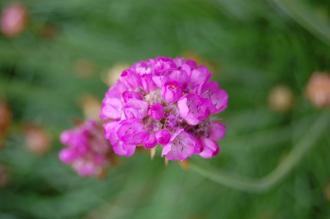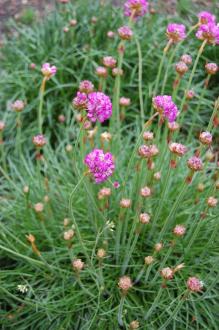
Armeria maritima ‘Splendens’ Flower (05/05/2012, Kew Gardens, London)
Position: Full sun
Flowering period: Late spring to summer
Soil: Moist, well drained
Eventual Height: 30cm
Eventual Spread: 30cm
Hardiness: 4a – 9a
Family: Plumbaginaceae
Armeria maritima ‘Splendens’ is a robust, evergreen, clump forming herbaceous, perennial. Its dark green leaves are narrow, numerous, grass like and up to 20cm long. Its individual dark pink flower heads contain numerous corolla, each consisting of five petals, there are arranged as a sphere and are produced on erect stems. Each fruit capsule contains a single seed.
The species Armeria maritima, commonly known as Sea Pink, Sea Thrift or Thrift, is native to coastal areas of Europe (including the UK) and other parts of the Northern hemisphere.
The etymological root of the binomial name Armeria is from the ancient Latin name for Dianthus, which this plant resembles. Maritima is from the Latin meaning ‘near by the sea’, referring to this plants preferred growing location. Splendens is from the Latin meaning ‘brilliant’

Armeria maritima ‘Splendens’ (05/05/2012, Kew Gardens, London)
The landscape architect may find Armeria maritima ‘Splendens’ useful in exposed coastal locations and other locations where salt levels are elevated, including road and path edges. It is tolerant of salt laden winds. Once established this plant is drought tolerant.
Ecologically, Armeria maritima ‘Splendens’ is attractive to a variety of pollinating insects, including bees, flies, beetles, moths and butterflies.
Armeria maritima ‘Splendens’ prefers moist, well-drained soils. It tolerates most pH of soil. It will tolerate poor soils, it will not tolerate water logging.
Armeria maritima ‘Splendens’ requires little maintenance. Large clumps may be divided in late autumn or early spring.

